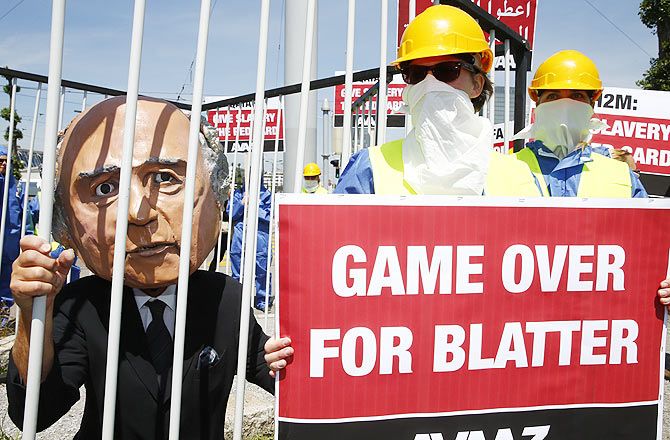
America's chances of hosting the 2026 World Cup are not likely to be hurt by a US led corruption investigation that has ensnared key figures in FIFA, world soccer's governing body, analysts said on Thursday.
- Canada, US will not support Blatter for FIFA presidency
- FIFA arrests spur Brazil to probe soccer corruption
"It would be hard to believe that the people who are left in power at FIFA would attempt to penalize the United States because of a multi-country international investigation," said Rick Horrow, a sports business consultant and lecturer at Harvard Law School.
"There's always that possibility but if the existing FIFA decision-making structure survives these unprecedented indictments ... it would call for more transparency and objectivity than ever before, which would play to the strong suit of the United States," Horrow added.
Nine soccer officials and five sports media and promotions executives were hit on Wednesday by US federal prosecutors with corruption charges allegedly involving more than $150 million in bribes.
The question is whether the lead role played by the United States in tackling corruption in FIFA will damage American hopes of staging future World Cups.
Russia already has been picked as 2018 host while Qatar will stage the 2022 soccer showcase.

"There is a business component to the decision," said Alexi Lalas, a former defender with the U.S. national team who played in the 1994 World Cup.
"Having a World Cup in the United States, I think everybody would agree -- whether you support it or not -- would be incredibly successful."
FIFA's decision to award the event to Russia and Qatar meant that CONCACAF, the governing body for soccer in North and Central America and the Caribbean, would have to wait at least 32 years between tournaments after the United States hosted the 1994 World Cup.
Horrow said economics, favorable time zones for television coverage and corporate sponsorship would make the United States an attractive host in 2026.
Although no CONCACAF country has formally bid for the 2026 World Cup, the United States, Canada and Mexico have all expressed an interest.
Qatar's successful bid to host the World Cup has been shrouded in controversy due to allegations of corruption in the selection process, along with the country's searing summertime heat and its treatment of migrant laborers.
Swiss prosecutors said they had opened their own criminal proceedings against unidentified people on suspicion of mismanagement and money laundering related to the awarding of rights to Russia and Qatar.
"It may be too early to say that 2018 and 2022 are done deals," warned Robert Boland, a sports business consultant and member of Ohio University faculty.
"This investigation may have opened the well that will poison both of those along the way. That’s speculation, but certainly possible."

Canada, which will host the Women's World Cup starting June 6, could prove an attractive option providing many of the same benefits as the United States.
Lalas said soccer has grown tremendously in the United States since 1994 and getting the 2026 bid "would be a success unlike anything that FIFA has seen in the past."
"I have no problem saying that," he said.
"And that's not just the American in me coming out."
Reacting to the FIFA scam, US Soccer Federation president Sunil Gulati told the New York Times that anger quickly followed his shock and disappointment at the indictments.
That anger, he added, only confirmed a decision he had already made, that the US would vote for the only man opposing Blatter's re-election to a fifth term.
Gulati acknowledged that such a vote could dim US hopes of hosting a future World Cup.
"Would I like to see the United States host a World Cup in the future?" Gulati said.
"The answer is, of course, yes. But for me, and for US soccer, better governance and more integrity at CONCACAF and FIFA are far more important than hosting any international soccer tournament."
With its burgeoning appetite for high-level football, the United States has long been regarded as a front-runner for the 2026 World Cup.
By then the game's global showcase wouldn't have been held in a country from the North and Central American and Caribbean region for more than 30 years.
The next two editions, in 2018 and 2022, are slated for Russia and Qatar, and FIFA has insisted those venues won't change even as Swiss authorities probe corruption in the voting process that awarded them.
"I'm sure there are some people who would disagree with that decision and would prioritize things differently," Gulati told the Times.
"But this is how we feel, and we are doing what we think is right."







